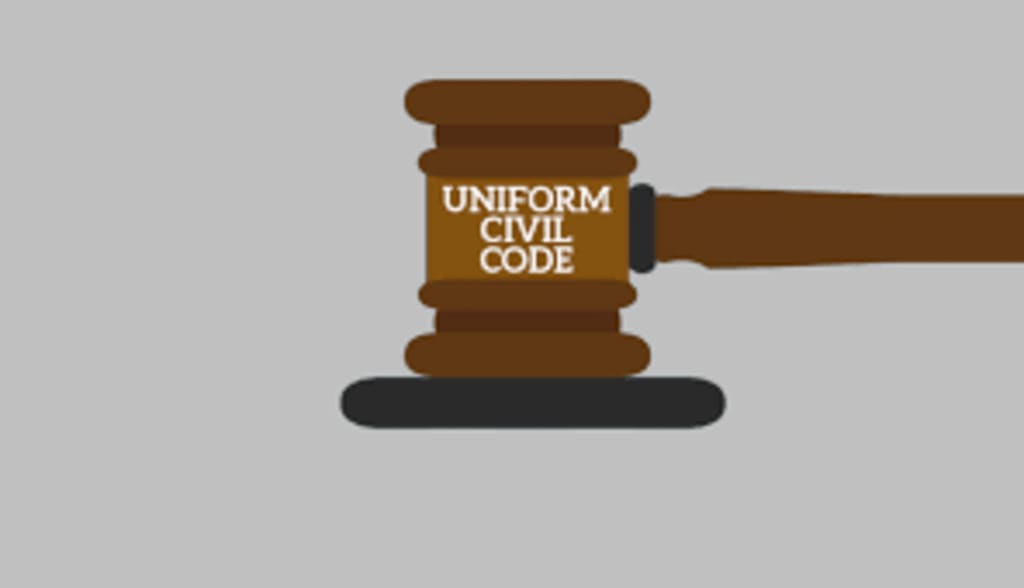
What is the Uniform Civil Code, why it is necessary.
Uniform Civil Code in India is the proposal to replace the personal laws based on the scriptures and customs of each major religious with a common set governing every citizen. These laws are distinguished from public law and cover marriage, divorce, inheritance, adoption and maintenance.
Provisions of Uniform Civil Code in the Indian Constitution
Article 44 of the Constitution, one of the Directive Principles of State Policy, states that, the State must seek to ensure for people a uniform civil code across India's territory. However, as Article 37 states, directive principles are guiding principles for government policies and are not enforceable by courts.
The Pros and Cons of the Uniform Common Code
1] To give equivalent status
In the cutting-edge period, a mainstream popularity-based republic ought to have a typical common and individual regulations for its residents regardless of their religion, class, rank, orientation and so on.
2] To advance orientation equality
It is normally seen that individual laws of practically all religions are oppressive towards ladies. Men are generally conceded upper special status in issues of progression and legacy. Uniform common code will bring all kinds of people at standard.
3] Accommodate the yearnings of the youthful populace
A contemporary India is an absolutely new society with 55% of its populace is under 25 years old. Their social perspectives and yearnings are formed by general and worldwide standards of uniformity, humankind, and innovation. Their perspective on shedding personality based on any religion must be given a serious thought to use their maximum capacity towards country building.
4] Support the public coordination
All Indian residents are now equivalent under the steady gaze of the official courtroom as the criminal regulations and other common regulations (with the exception of individual regulations) are same for all. With the execution of Uniform Common Code, all resident will have similar arrangement of individual regulations. There will be no extent of politicization of issues of the separation or concessions or extraordinary honors delighted in by a specific local area based on their specific strict individual regulations.
5] To change of existing individual regulations
Existing individual regulations are mostly founded on the privileged man centric thoughts of the general public in all religions. The interest of UCC is ordinarily made by bothered ladies as a substitute for existing individual regulations as man centric standard individuals actually consider the changes in private regulations will obliterate their holiness and go against it bountifully.
The Cons of Uniform Common Code
1] Practical troubles in India
It is basically hard to concoct a typical and uniform arrangement of rules for private matters like marriage because of enormous social variety India across the religions, orders, standings, states and so on.
2] Perception of UCC as infringement on strict opportunity
Numerous people group, especially minority networks see Uniform Common Code as an infringement on their privileges to strict opportunity. They dread that a typical code will disregard their customs and force rules which will be essentially directed and impacted by the larger part strict networks.
3] Interference of state in private matters
The constitution accommodates the right to opportunity of religion. With codification of uniform principles and its impulse, the extent of the opportunity of religion will be decreased.
4] Sensitive and extreme assignment
Such a code, in its actual soul, should be achieved by getting uninhibitedly from various individual regulations, rolling out steady improvements in each, giving legal professions guaranteeing orientation balance, and embracing extensive understandings on marriage, support, reception, and progression by recognizing the advantages that one local area gets from the others. This undertaking will be exceptionally requesting time and human asset wise. The public authority ought to be delicate and unprejudiced at each step while managing the greater part and minority networks. If not, it could end up being more lamentable in a type of mutual viciousness.
Almost all the countries of the world have a common civil code for all their citizens. The basic Idea behind the formulation of a uniform civil code is to end discriminations based on religions.Personal law of nearly all the religions have acted as a tool of oppression of the women through Which they are suppressed most of the times citing religious and social obligations. Personal Laws have always played a big role in causing the rise of gender discrimination. Uniform civil code guaranteed by the constitution has also become a very sensitive and controversial issue, which has always been communalized by people having vested interests. The crusade for the implementation of the uniform civil code should get the support to fall Progressive and right thinking citizens of the country. It is the need of the hour. There is also need for a political consensus to implement the uniform civil code. In a nutshell, uniform civil Code is necessary to affect an integration of a country as diversified as India by bringing all the Communities in to a common platform which do not form the essence of a single particular religion. A uniform civil code will also enforce the idea of secularism enshrined in the Indian Constitution more forcefully. At the end Unity which raise as an output of Uniform Civil Code help India to grow with comprehensiveness.
About the Creator
Arvind
I am advocate by profession and writer
Enjoyed the story? Support the Creator.
Subscribe for free to receive all their stories in your feed. You could also pledge your support or give them a one-off tip, letting them know you appreciate their work.





Comments
There are no comments for this story
Be the first to respond and start the conversation.